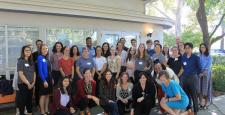UC Davis to Host Mentoring Institute for Early Career Poverty Researchers
CPIR Awarded Grant, Deputy Director Jacob Hibel to lead mentoring insitute
UC Davis College of Letters and Science
October 13, 2021
The UC Davis Center for Poverty and Inequality Research recently
received a $353,421 federal grant to launch a program to
help up-and-coming poverty scholars get their careers off to a
strong start.
The Early Career Mentoring Institute, which will run for one week each spring of 2022, 2024 and 2026, aims to nurture a diversity of scholars studying poverty and social mobility.
Each institute will host 12 women and underrepresented minorities from across the nation who have completed their doctorates and are establishing their academic careers.
The grant from the U.S. Department of Health and Human Services is part of a five-year, $10.6 million award to the University of Wisconsin-Madison Institute for Research on Poverty. The sole federally funded National Research Center on Poverty and Economic Mobility, the University of Wisconsin-Madison partnered with UC Davis and eight other university centers on an array of poverty research programs.
The Center for Poverty and Inequality Research received additional support from the UC Davis College of Letters and Science to develop and host the mentoring institute.
Jacob Hibel, associate professor of sociology and deputy director of the multidisciplinary center, said the Early Career Mentoring Institute will help close a gap in pipeline programs that provide support to women and scholars of color through graduate school, but offer little help in learning to thrive as new faculty.
“There’s a good deal of research showing that women and ethnoracial minority scholars take longer than white male scholars to get to tenure — and are more likely to leave the academy before getting tenure,” Hibel said.
“They get trained really well, and they do the research, but then when they become a professor, there are all these other service obligations,” he said. “It’s becoming an increasingly competitive marketplace for getting research grants and getting manuscripts accepted by research journals — and these are the main currency that scholars need to advance in their careers. So there really is a need for increased mentoring and increased support.”
Hibel said another goal of the institute is to broaden the range of expertise available to policymakers beyond economics to include anthropology, political science, sociology and other social sciences.
Each institute will feature four faculty mentors — two from UC Davis — and four keynote speakers, and offer participants paper workshopping, research methodology consulting, professional mentoring and informal networking.
“The goal is to build an enduring network of scholars, not just a one-week-and-done sort of thing,” said Hibel, who will direct the professional development program with the help of Marianne Page, professor of economics and director of the Center for Poverty and Inequality Research.









